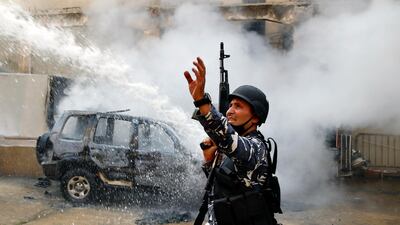Lebanon’s Future Movement on Sunday said it would not attend meetings with the president to discuss the government’s recently agreed to economic rescue plan.
The party of former prime minister Saad Hariri refused to attend the Baabda Palace meeting with President Michel Aoun, saying Parliament was the proper place for parties to be told of the government’s work.
Last Thursday, Cabinet agreed on a major economic rescue plan to stabilise the collapsing currency, reduce the country's debt and protect the most vulnerable.
"The natural place for informing the parliamentary blocs on the program is the parliament,” the bloc said, according to the state-run National News Agency.
It said the move “perpetuates the concept of a presidential system at the expense of the parliamentary democratic system".
Mr Hariri stood down in October making room for Prime Minister Hassan Diab to form a new administration amid a nationwide protest movement and dire economic situation.
But Future Movement MPs and the former prime minister have accused the new administration, and backers including Mr Aoun, of trying to pin the blame for the situation of the the party and late former prime minister Rafik Hariri.
On Friday, the party accused the new government of using the head of the central bank and others as scapegoats for the countries woes.
“Now that the government has approved its economic plans it has to start bearing the responsibility of implementing the solutions,” it said.
Rafik Hariri was the architect of post-war reconstruction and led the country through boom in construction and growth in the late 1990s.
But he is accused of helping to build a system that has allowed corruption and nepotism.
Lebanon faces total economic collapse with the currency, officially pegged at 1,507 pounds to the dollar, now trading at about 4,000.
Shops are limiting purchases amid national shortages and there has been a return of clashes on the streets as poverty and unemployment rise rapidly.
The government last week set out a plan that includes passing reforms to access $11 billion (Dh40.4bn) in aid and soft loans the international community pledged in 2018.
It is also entering talks with the International Monetary Fund for a major bailout.















